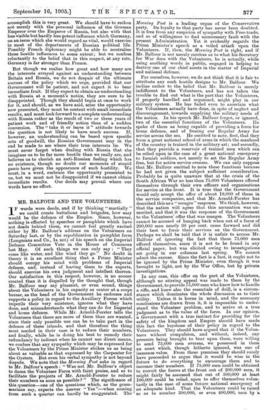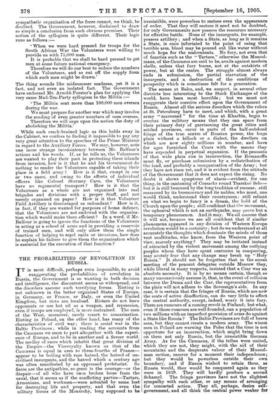I F words were deeds, and if by thinking " martially
" we could create battalions and brigades, how easy would be the defence of the Empire. Since, however, nothing is effected by. speeches or pamphlets which have not deeds behind them, we cannot feel greatly excited either by Mr. Balfour's address on the Volunteers on Saturday last, or by the republication in pamphlet form, (Longmans and Co., Is. net) of his speech on the Imperial Defence Committee Vote in the House of Commons last May. Of such things we can only say : " They come like water, and like wind they go." No doubt in theory it is an excellent thing that a Prime Minister should occupy his mind with problems of Imperial defence, and, instead of leaving them to the experts, should exercise his, own judgment and intellect thereon. Our satisfaction in this respect, however, is no sooner created than it is dispelled by the thought that, though Mr. Balfour may say pleasant, or even sound, things about the Volunteers in his capacity as orator at a corps bazaar, as the head of the Government he endorses and supports a policy in regard to the Auxiliary Forces which imperils their very existence, ignores what they have done, and misunderstands what they can do for Imperial and home defence.. While Mr. Arnold-Forster tells the Volunteers that there are more of them than are wanted, since their only possible use can be to take part in the defence of these islands, and that therefore the thing most needed in their case is to reduce their numbers, and finally, while he .is doing his best to, remedy their redundancy by indirect when he cannot use direct means, we confess that any sympathy which may be expressed for the Volunteers by the Prime Minister strikes us as being about as valuable as that expressed by the Carpenter for the Oysters. But even his verbal sympathy is not beyond dispute. We note that the Morning Post asks in regard to Mr. Balfour's speech : " Was not Mr. Balfour's object to damn the Volunteer Force with faint praise, and, so to facilitate the projects of Mr. Arnold.-Forster to reduce their numbers as soon as possible?" The significance of this question—one of the questions which, as the gram- marians say, expects the, answer " Yes "—when coming from such a quarter can hardly be exaggerated. The Morning Post is a leading organ of the Conservative party. . Its loyalty to that party has never been doubted. It is free from any suspicion of sympathy with Free-trade, and so of willingness to find unnecessary fault with the present Administration. Yet it evidently regards the Prime Minister's speech as a veiled attack upon the Volunteers. If, then, the Morning Post is right, and if Mr. Balfour is not merely careless as to what his Secretary for War does with the Volunteers, he is actually, while using soothing words in public, engaged in helping to destroy one of our chief assets in the matter of Imperial and national defence.
For ourselves, however, we do not think that it is fair to attribute any such hostile designs to Mr. Balfour. We' incline rather to the belief that Mr. Balfour is merely indifferent to the Volunteers, and has not taken the trouble to find out what is the part that the Volunteers, if properly handled and organised, might play in our military system. He has failed even to ascertain what the Volunteers actually have done, in spite of neglect and discouragement, towards supplying the military needs of the nation. In his speech Mr. Balfour forgot, or ignored, two of the essential functions of the Volunteers. . He spoke of them as being capable of providing a force for home defence, and of freeing our Regular Army for service across the sea. He omitted to note, first, that they form a great national school of arms in which the manhood of the country is trained in the military art; and secondly, that they provide a reservoir of trained men which can be relied upon in the case of a great national emergency to furnish soldiers, not merely to set the Regular Army free, but for active service oversea. We can only suppose that Mr. Balfour omitted to note these functions because he had not given the subject sufficient consideration. Probably he is quite unaware that at the crisis of the South African War no less than 75,000 Volunteers offered themselves through their own officers and organisations for service at the front. It is true that the Government would only accept the offer of about 18,000 of these in the service companies, and that Mr. Arnold-Forster, has described this as a " meagre " response. We think, however, that the nation will agree that this accusation was un- merited, and that it was the response of the Government' to the Volunteers' offer that was meagre. The Volunteers cannot be accused of hanging back when out of a force of, 200,000 men nearly 38 per cent. came forward and did their best to force their services on the Government. Perhaps we shall be told that it is unfair to accuse 'Mr. Balfour of ignoring the fact that these 75,000 men offered themselves, since it is not to be found in any official paper, but was elicited owing to investigations set going in our columns last spring. We cannot admit the excuse. Since the fact is a fact, it ought not to be ignored by the Prime Minister, even though it was brought to light, not by the War Office, but by private investigations.
In any case, this offer on the part of the Volunteers, although no stirring appeal was made to them by the Government, to provide 75,000 men who knew how to handle a rifle, and knew also the essentials of drill, is a circum- stance which dominates the whole discussion as to their utility. Unless it is borne in mind, and the necessary conclusions are drawn from it, it is impossible to under- stand the Volunteer problem, and to arrive at a true judgment as to the value of the force. In our opinion, a Government with a true instinct for providing for the safety of the kingdom and Empire should have made this fact the keystone of their policy in regard to the Volunteers. They should have argued that it the Volun- teers without compulsion, and without, indeed, any pressure being brought to bear upon them, were willing to send 75,000 men oversea, we possessed in them an asset which, though hitherto ignored, was one of immense value. From these premises they should surely have proceeded to argue that it would be wise in the future to do everything to encourage them and to increase their numbers. If 75,000 men could be obtained to recruit the forces at the front out of 200,000 men, it might fairly be assumed that out of 300,000 at least 100,000 could be relied, upon to offer themselves volun- tarily in the case of some future national_ emergency of an adequate kind. That the Volunteers could be raised so as to number 300,000, or even 400,000, Men by a sympathetic organisation of the force cannot, we think, be doubted. The Government, however, disdained to draw so simple a conclusion from such obvious premises. Their notion of the syllogism is quite different. Their logic runs as follows :- 'When we were hard pressed for troops for the South African War the Volunteers were willing to provide us with 75,000 men.
It is probable that we shall be hard pressed to get men at some future national emergency.
Therefore we will do our best to reduce the numbers of the Volunteers, and so cut of the supply from which such men might be drawn.'
The thing sounds like midsummer madness, yet it is a fact, and not even an isolated fact. The Government have endorsed Mr. Arnold-Forster's plan for applying the very same Mad-Tea-Party syllogism to the Militia The Militia sent more than 100,000 men oversea during the war.
We must prepare for another war which may involve the sending of even greater numbers of men oversea. Therefore we will urge upon the nation the duty of abolishing the Militia.'
While such crack-brained logic as this holds sway in the Cabinet, we confess to finding it impossible to pay any very great attention to the speeches of the Prime Minister in regard to the Auxiliary Forces. We may, however, note one more strange inconsistency between Mr. Balfour's actions and his words. If, as he tells us, the Volunteers are wanted to play their part in protecting these islands from invasion, how is it that he and his Government do nothing to render the Volunteers capable of taking their place in a field army ? How is it that, except in one or two cases, and owing to the efforts of individual officers like Colonel Sturmey Cave, the Volunteers have no regimental transport ? How is it that the Volunteers as a whole are not organised into real brigades and divisions with a proper Staff, and not merely organised on paper ? How is it that Volunteer Field Artillery is discouraged as redundant ? How is it, in fact, if they are wanted for purposes of home defence, that the Volunteers are not endowed with the organisa- tion which would make them efficient? In a word, if Mr. Balfour is going to ignore the functions of the Volunteers in acting as a school of arms and in providing a reservoir of trained men, and will only allow them the single function of helping to repel raids or invasions, how does he explain his failure to give them the organisation which is essential for the execution of that function ?











































 Previous page
Previous page